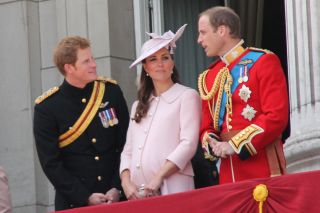Family Dynamics
Sibling Rivalry Psychology Predicts Royal Family Revelations
The rebelliousness of later-borns may be predicted by birth order.
Posted January 6, 2023 Reviewed by Tyler Woods
Key points
- Sibling rivalry theory may predict conflict between brothers and other siblings.
- Birth order theory also attempts to explain why siblings may turn out very different from each other psychologically.
- Birth order theory predicts later-borns are more rebellious than first-borns.
- We may be the product of our family dynamics more than we realize.
Under the headline "Prince Harry makes series of sensational claims in new memoir", the BBC News website reports that Prince Harry's autobiography, Spare, outlines various complaints and acrimony in the Royal Family. One of the most striking claims from Harry involves him being physically attacked by his brother.

First-Borns Are More Likely to Bully Later-Borns
While many media outlets have fastened onto this aspect of the shocking revelations, in fact, the psychological research on this subject reveals that violence between siblings is actually the most frequent form of family violence.
In a recent study entitled, “Trouble in the Nest: Antecedents of Sibling Bullying Victimization and Perpetration”, involving a very large sample of 6,838 children from the United Kingdom, a key finding is how common violence between siblings turned out to be. 31 percent of siblings were kicked, hit, pushed, or shoved at some time.
The authors of the study, Slava Dantchev and Dieter Wolke from the University of Warwick, also point out that there is increasing evidence that sibling bullying and victimization have adverse long-term consequences, including increased loneliness, peer difficulties, delinquency, and various mental health problems.
This is a particularly interesting comment in light of the media storm around Prince Harry’s revelations—it suggests that it is possible that sibling violence might be the particularly significant cause of many future problems in a person’s life, rather than just being one of a long list of distressing life events.
The study concludes that children who grow up in larger households were more likely to be involved in sibling bullying perpetration; male children were more often bullies, female children and those with older brothers were more often victimized, and firstborn children were more likely to be perpetrators.
Evolutionary Theory Predicts Sibling Rivalry
The authors of the study concluded that their findings support the evolutionary psychology theory arguing that sibling aggression is a consequence of competition over resources. Households with more children may limit availability and access to resources including parental affection, attention, or material goods.
But evolutionary theory also provides a possible answer to how to resolve sibling rivalry.
A study entitled, “An Evolutionary Switch From Sibling Rivalry to Sibling Cooperation, Caused by a Sustained Loss of Parental Care”, found that in the animal kingdom, when parents provide parental care, siblings evolve to compete. Parental care, the authors argue, compensates for the costs of sibling rivalry. Second, when in nature, parents do not supply care, siblings evolve to cooperate. Sibling cooperation compensates for the loss of parental care.
But much of the media coverage of the Prince Harry revelations focuses on the shock that a member of the Royal Family should perform what appears to be such a total act of betrayal.
Yet here again, the science of psychology might provide an insight.
Does Birth Order Predict How We Turn Out?
A study entitled “Unpacking the Birth Order Effects” argues that younger siblings can either look up to older siblings and benefit from their experiences, or attempt to differentiate themselves, due to sibling rivalry.
In the book Born to Rebel, Frank Sulloway, an adjunct professor of psychology at the University of California- Berkeley, argued that, throughout history, later-borns have been more likely than first-borns to challenge the status quo.
Sulloway's most important finding is that eldest children identify with parents and authority, and support for the status quo, whereas younger children rebel against it.
Sulloway's most dramatic argument is that it is inside the family, with its powerful interpersonal dynamics, that is actually the stimulus for the great revolutionary advances that alter history. Through his analysis of revolutions in ideas, from the Reformation to Darwin's theory of natural selection, Sulloway contends that the primary engine of history is located within families, not outside families or between them, as, for example, the revolutionary Karl Marx believed.
Your Arrest Record Is Predicted By Your Birth Order
A study entitled, “Birth Order and Civil Disobedience: A Test of Sulloway's 'Born to Rebel' Hypothesis”, tested Sulloway's hypothesis among a group of U.S. college students who had participated in civil disobedience as part of a labor dispute.
The findings revealed a significant relationship between the number of times the students had been arrested and birth order.
Psychology, and evolutionary theory in particular, appear to predict that the later-born in any family, and maybe therefore particularly a Royal Family, could be more prone to rebelliousness due to deep psychological forces at work, beyond the media spotlight.
Is History Repeating Itself?
The late Queen Elizabeth had a younger sister, Princess Margaret, Countess of Snowdon.
From the 1950s onwards, Margaret became one of the world's most famous socialites, famed for her glamorous yet controversial lifestyle and rumoured romances. Most notoriously, she appeared to conduct an affair in the early 1950s with Peter Townsend, a married RAF officer in the royal household.
Margaret became a highly controversial member of the British royal family. Her divorce generated much negative publicity, while her private life became the subject of enormous press speculation.
Does psychology predict that history is going to repeat itself?
References
Trouble in the Nest: Antecedents of Sibling Bullying Victimization and Perpetration. Slava Dantchev and Dieter Wolke University of Warwick. Developmental Psychology 2019, Vol. 55, No. 5, 1059 –1071 0012-1649/19/$12.00 http://dx.doi.org/10.1037/dev0000700
An evolutionary switch from sibling rivalry to sibling cooperation, caused by a sustained loss of parental care Darren Rebar https://orcid.org/0000-0001-6170-2100 Nathan W. Bailey, Benjamin J. M. Jarrett, and Rebecca M. Kilner PNAS January 21, 2020 117 (5) 2544-2550
Unpacking the birth order effects Wifag Adnana , Konstantinos Chountasb , Ekaterini Kyriazidouc , and Tetyana Surovtsevad New York University Abu Dhabi, Abu Dhabi, United Arab Emirates Athens University of Economics and Business, Athens, Greece June 1, 2022 https://www2.aueb.gr/conferences/Crete2022/Papers/Chountas.pdf
Sulloway, F. J. (1996). Born to rebel: Birth order, family dynamics, and creative lives. Pantheon Books.
Birth Order and Civil Disobedience: A Test of Sulloway's “Born to Rebel” Hypothesis Richard L. Zweigenhaft &Jessica von Ammon. The Journal of Social Psychology Volume 140, 2000 - Issue 5, Pages 624-627




